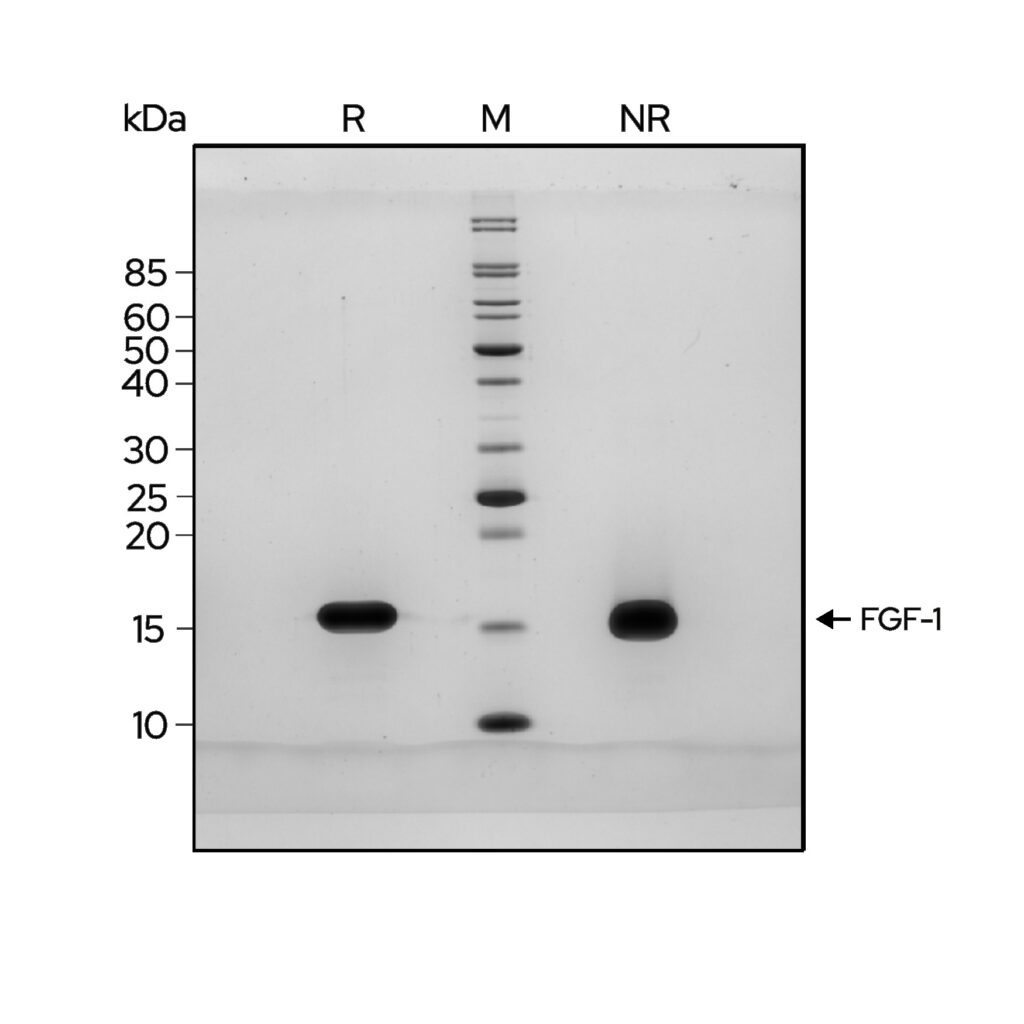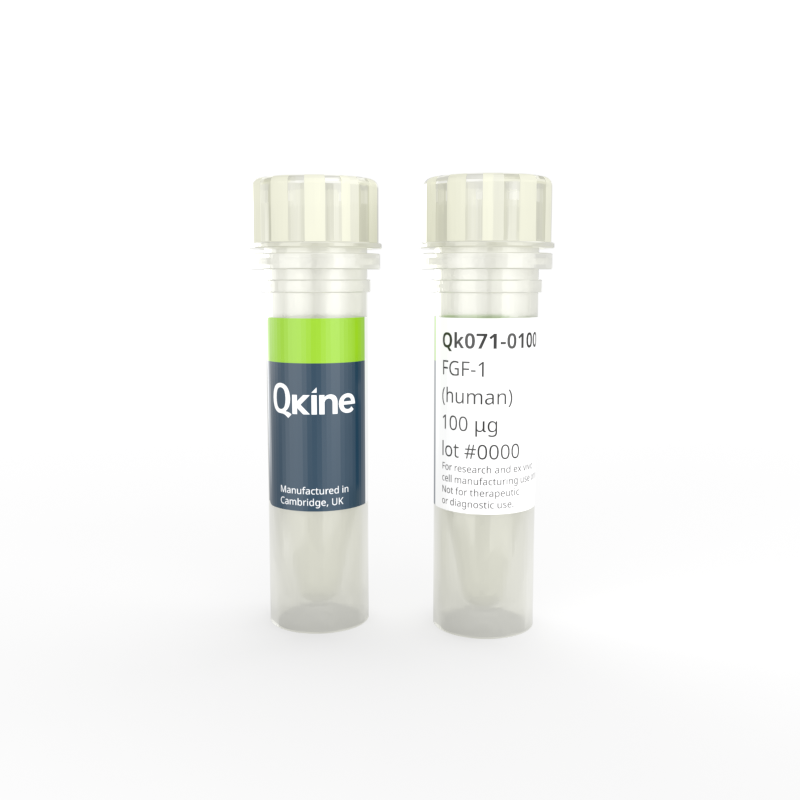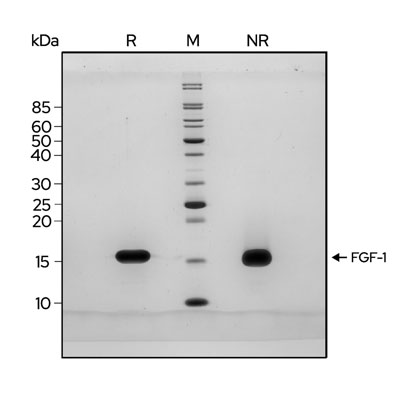 Recombinant human FGF-1 protein (Qk071)
Recombinant human FGF-1 protein (Qk071)Recombinant human FGF-1 protein (Qk071)
Price range: £175.00 through £880.00
Fibroblast Growth Factor 1 (FGF-1) can stimulate growth and differentiation of endothelial and epithelial cells and the development of organoids. FGF-1 can also be used for the maintenance of oligodendrocytes and astroglia as well as bone marrow-derived mesenchymal and hematopoietic stem cells.
Qkine human FGF-1 has a molecular weight of 15.9 kDa. This protein is animal origin-free, carrier-free and tag-free to ensure its purity with exceptional lot-to-lot consistency. Qk071 is suitable for the culture of reproducible mesenchymal, endothelial, hematopoietic, glial, and other relevant cells.
In stock
Orders are typically shipped same or next day (except Friday).
Easy world-wide ordering, direct or through our distributors.
Price range: £175.00 through £880.00
Buy online with secure credit card or purchase order. For any questions, please email orders@qkine.com
Summary:
- High purity human protein (Uniprot number: P05230)
- 15.9 kDa (monomer)
>98%, by SDS-PAGE quantitative densitometry
Expressed in E. coli
Animal origin-free (AOF) and carrier protein-free
Manufactured in our Cambridge, UK laboratories
Lyophilized from Tris, NaCl, CyS
- Resuspend in sterile-filtered water at >50 µg/ml, add carrier protein if desired, prepare single use aliquots and store frozen at -20 °C (short-term) or -80 °C (long-term).
Featured applications:
Epithelial organoid culture
Differentiation of iPSCs into epithelial cells
Mesenchymal stem cell research
Organoid growth and proliferation
Differentiation of neural progenitor cells into oligodendrocyte precursor cells
Maintenance and differentiation of hematopoietic stem cells

FGF-1 activity was determined using the FGF-1-responsive firefly luciferase reporter assay. HEK293T cells were treated in triplicate with a serial dilution of FGF-1 for 3 hours. Firefly luciferase activity was measured and normalised to the control Renilla luciferase activity. EC50 = 0.81 ng/ml (51 pM). Data from Qk071 lot #204543.
Recombinant FGF-1 migrates as a major band at approximately 15.97 kDa in non-reduced (NR) and reduced (R) conditions. No contaminating protein bands are present. The purified recombinant protein (3 µg) was resolved using 15% w/v SDS-PAGE in reduced (+β-mercaptoethanol, R) and non-reduced (NR) conditions and stained with Coomassie Brilliant Blue R250. Data from Qk071 batch #204543.

Further quality assays
Mass spectrometry: single species with expected mass
Recovery from stock vial: >95%
Endotoxin: <0.05 EU/μg protein
We are a company founded and run by scientists to provide a service and support innovation in stem cell biology and regenerative medicine. All our products are exceptionally high purity, with complete characterisation and bioactivity analysis on every lot.

Qkine FGF-1 is as biologically active as a comparable alternative supplier protein. HEK293T luciferase reporter cells were treated in triplicate with a serial dilution of Qkine FGF-1 (Qk071, green) or alternative supplier protein (Supplier B, black) for 3 hours. Firefly luciferase activity was measured and normalized to control Renilla luciferase activity. Data from Qk071 lot #204537.
Protein background
Fibroblast Growth Factor 1 (FGF-1) is a member of the FGF family and regulates the proliferation, migration, and differentiation of mesenchymal cells [1–3]. It plays a crucial role in multiple biological processes including embryonic development and tissue regeneration [1, 2, 4, 5]. It is a key regulator of angiogenesis and wound healing as it regulates the proliferation and maintenance of endothelial and epithelial cells [3]. It has neurotrophic properties to protect and repair neurons and lipid metabolism functions to regulate adipocytes [5, 6]. FGF-1 can also promote the differentiation of hematopoietic stem cells [7]. Notably, FGF-1 is implicated in the tumor growth and migration [8].
FGF-1 is composed of 155 amino acids, with a molecular weight of approximately 17-18 kDa [2, 9]. It consists of 12 anti-parallel β-strands organized into a three-fold symmetric β-sheet [10]. FGF-1 binds to different FGF receptors such as FGFR1 triggering several signaling cascades involved in cell growth, proliferation, migration, survival, and differentiation. These include the Ras/Raf/Mek/Erk, Pi3k/Akt, Jnk/Mapk, and STAT3/NF-kb pathways [8].
The role of FGF-1 on embryonic development and the regulation of mesenchymal cells makes it a growth factor used for a range of different cultures in vitro. FGF-1 is used to promote the differentiation and proliferation of endothelial cells and epithelial cells [11, 12]. As FGF-1 also promotes the branching of epithelial cells, it has been used for embryonic lung epithelium cultures and human iPSC-derived uretic bud organoids [13, 14]. Additionally, its neurotrophic properties make it ideal for the maintenance of neural progenitors as well as supporting cells such as oligodendrocytes, and astroglia [5, 15–17]. FGF-1 has also been reported for the culture of bone marrow-derived mesenchymal and hematopoietic stem and progenitor cells [7, 18, 19].
Because of its diverse roles in cellular processes, FGF-1 is a target of interest in various clinical applications, including regenerative medicine, wound healing therapies, and potential treatments for metabolic disorders and neurodegenerative diseases [3, 6, 16]. In Type 2 diabetes, FGF-1 injections could lower the glucose level without risk of hypoglycemia through its effect on glucose-sensing neuronal circuits [6]. In neurodegenerative diseases such as multiple sclerosis, FGF-1 could promote the remyelination of neurons [16]. Its role in angiogenesis could have great potential for novel therapies for myocardial infarction4. Finally, its involvement in cancer progression has led to investigations into targeted therapies to inhibit FGF-1 signaling in cancer cells.
FAQ
Fibroblast growth factor 1 (FGF-1) or acidic fibroblast growth factor (aFGF) is an FGF family member with a role in regulating cell growth, differentiation, and migration. FGF-1 is involved in vital biological processes like tissue repair, angiogenesis, wound healing, and embryonic development.
FGF-1 expression varies in different tissues, with high levels found in the brain and kidney. Expression is elevated in some cancers.
Yes, FGF-1 is a cytokine growth factor.
The FGF1 gene encodes for acidic fibroblast growth factor (aFGF)/ fibroblast growth factor 1 (FGF-1) protein.
FGF-1 can bind to multiple FGFRs, including FGFR1, FGFR2, FGFR3, and FGFR4.
FGFR1 and its associated signaling pathways are critical for cell growth, proliferation, migration, differentiation, and survival.
FGFR1 activation stimulates multiple signaling pathways including RAS/MAPK, PI3K/AKT and PLCγ pathways.
Recombinant FGF-1 can be used for differentiation maintenance of oligodendrocytes and astroglia.
Our products are for research use only and not for diagnostic or therapeutic use. Products are not for resale.
For use in manufacturing of cellular or gene therapy products. Not intended for in vivo applications.

Receive an Amazon gift voucher when you leave us a review.
£25, $30 or €30 for reviews with an image and £10, $15 or €15 for reviews without an image

